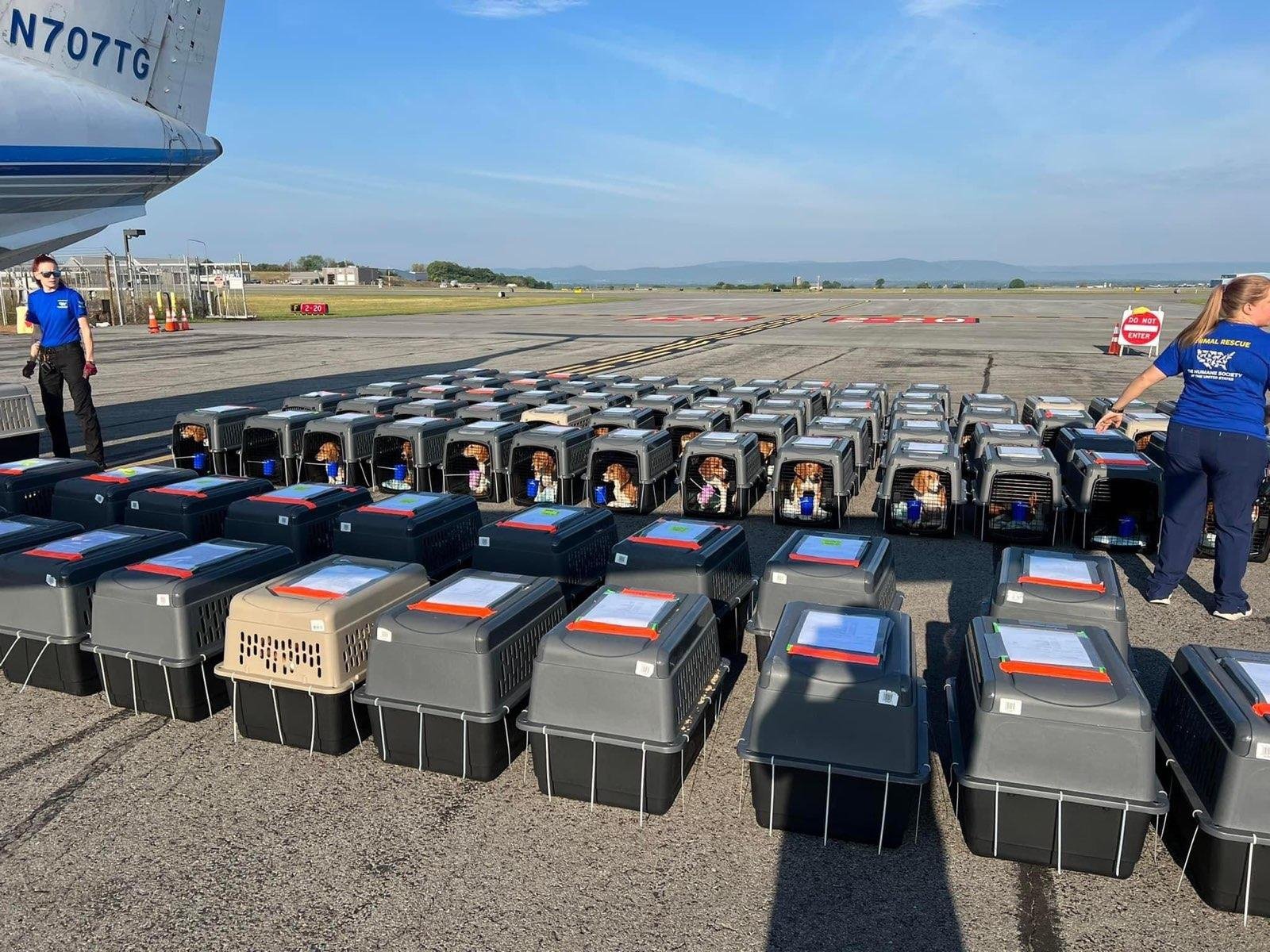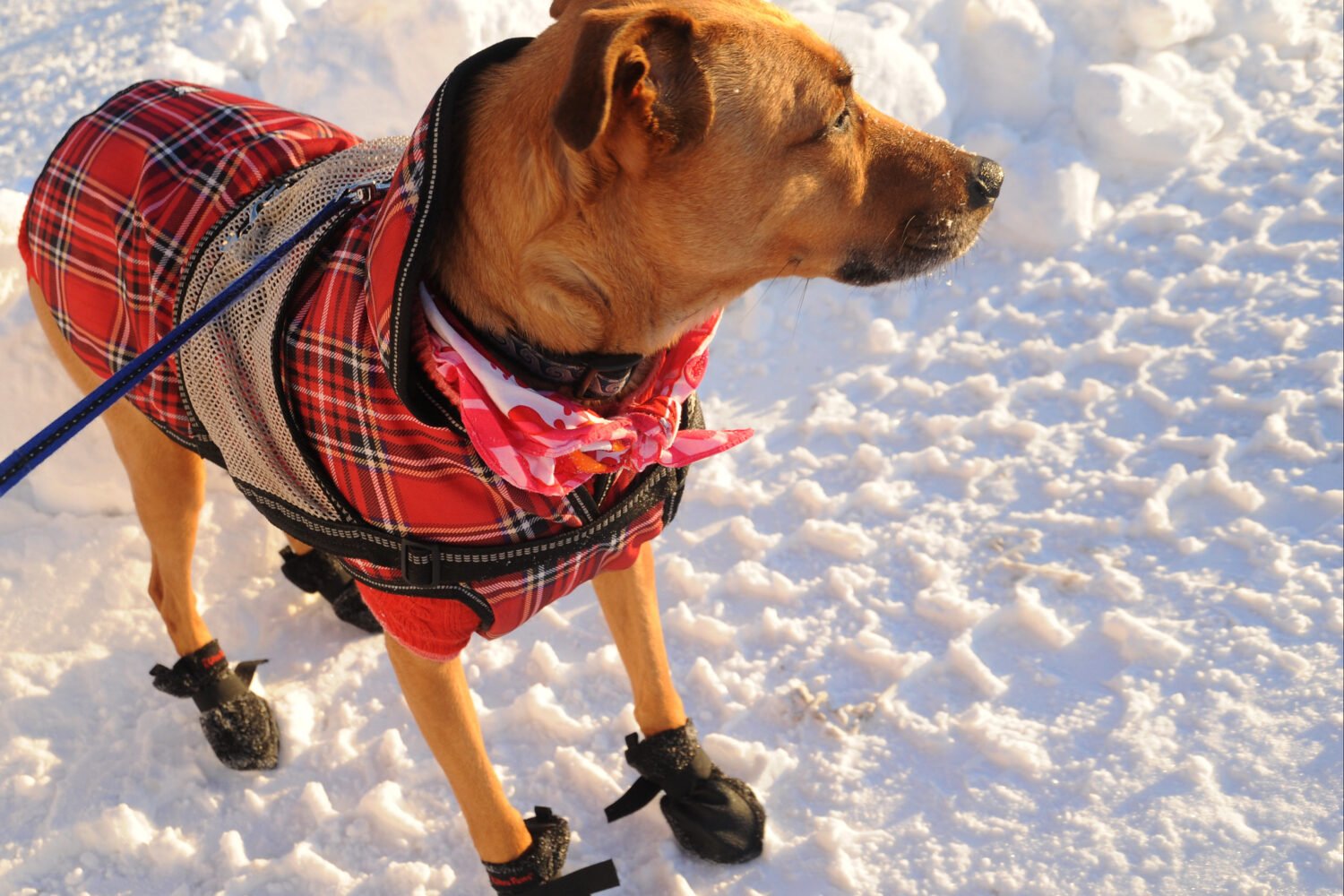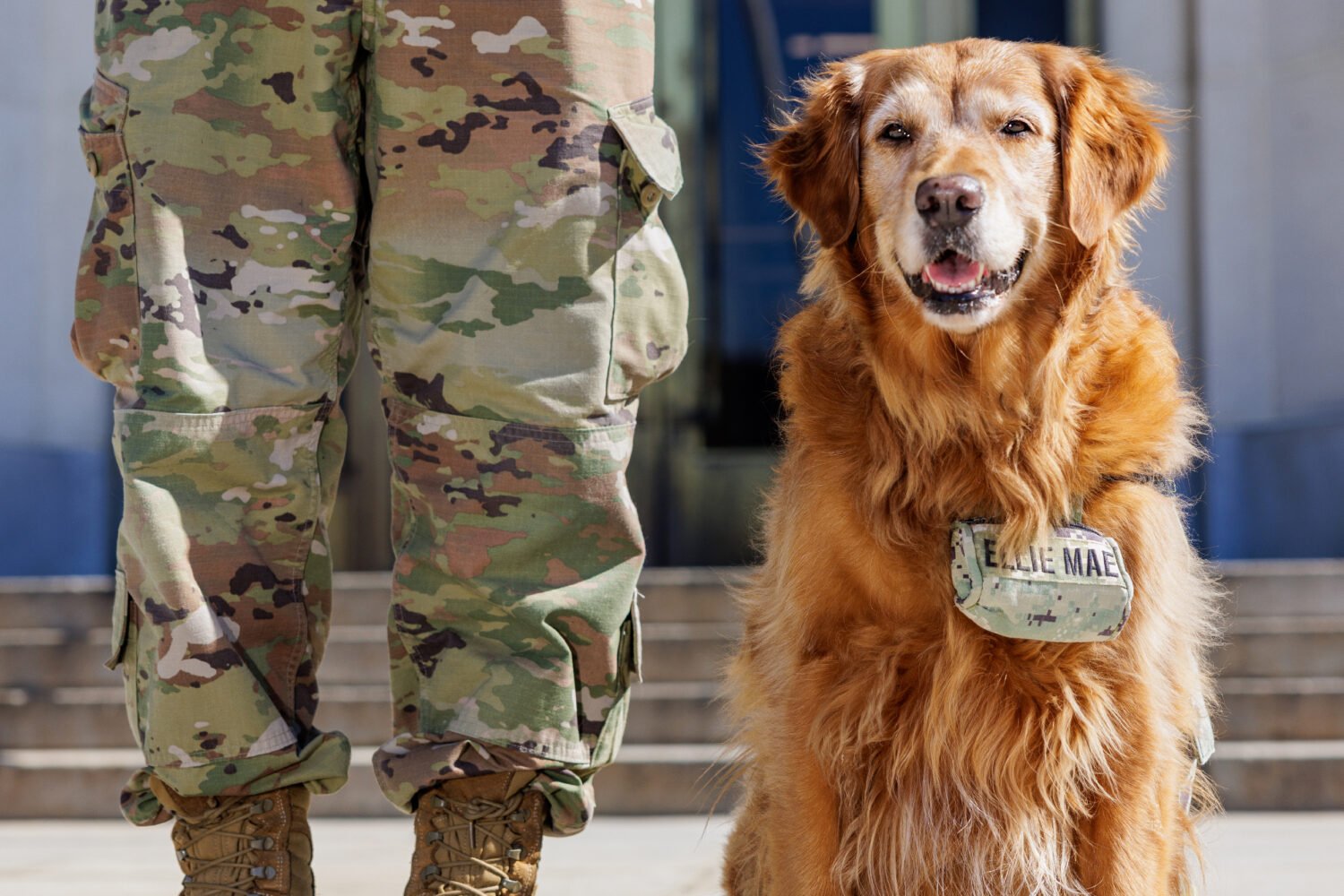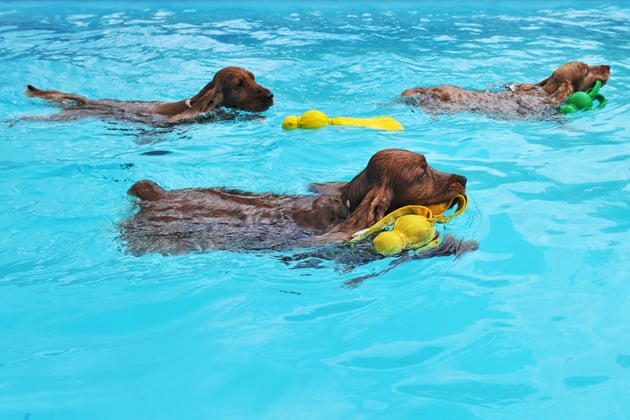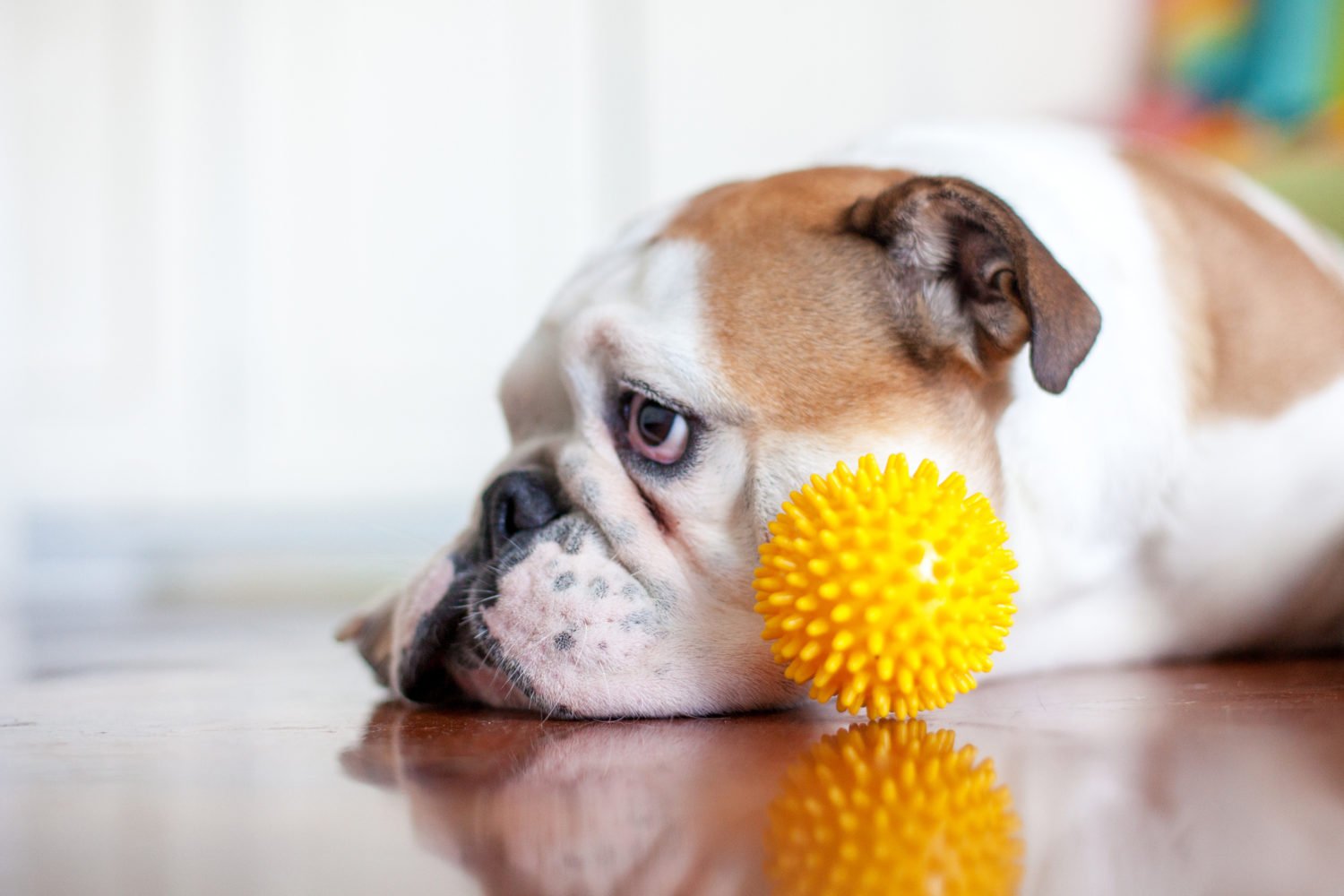Contents
In July, more than a dozen dogs gathered in Leesburg under circumstances that would have been unimaginable when they were born. Their paws touched grass. They didn’t have to fight for food—instead, they ate cupcakes served by people who cared about them. The company that once owned these dogs called them “research models.” You might know them as beagles.A year earlier, these animals were among the roughly 4,000 rescued from a facility in Cumberland, Virginia, where they’d been bred for scientific experiments. The traits that make beagles wonderful pets—compact size, docility, pleasant temperament—also make them ideal for research. In 2021, an undercover investigation by an animal-rights group found horrific conditions: dogs and puppies crammed into cages, some injured or dead, living in filth, eating rotting, maggot-infested food, and sometimes euthanized while they were conscious.
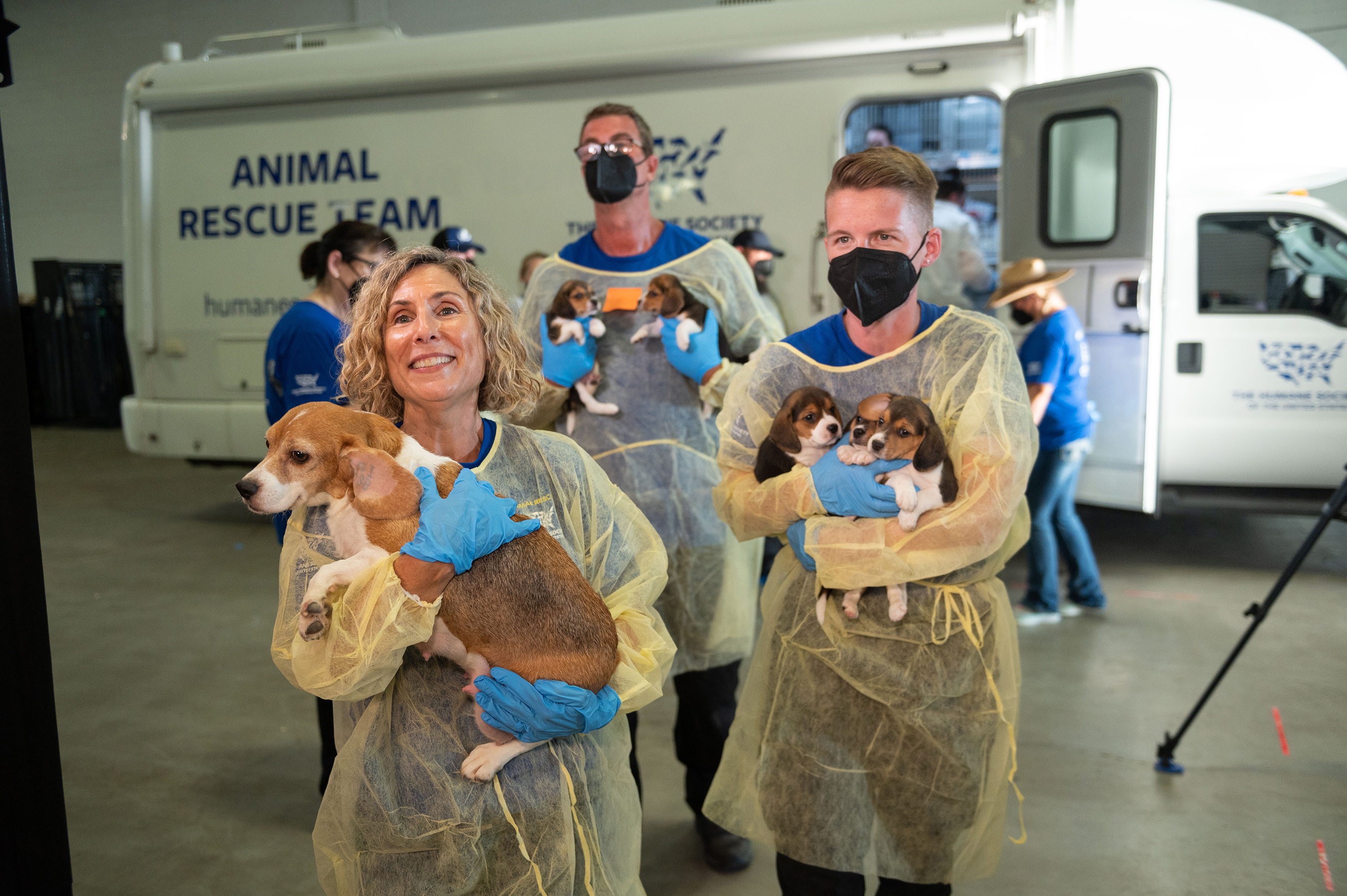
The company that owned the facility, Envigo, claimed it treated the beagles humanely. A series of USDA inspections found otherwise. Last year, after Envigo settled a lawsuit filed by the Justice Department against the company, a federal judge ordered the facility closed.
The largest rescue in the history of the Humane Society of the United States followed. The Envigo beagles became national news. That July, rescue groups collected thousands of them in Cumberland and began finding them homes. Some went west, including one adopted by Prince Harry and Meghan Markle. Many stayed in the Mid-Atlantic, where their new families communicate via Facebook groups and reunions such as the one in Leesburg, which saw guests enter a large backyard via a path decorated with balloons.
Inside, there was a tent with tiaras reading happy birthday and a banner proclaiming “Come, Sit, Stay, It’s Time to Paw-ty.” The beagles, many of whom wore envigo survivor bandannas, frolicked and bayed and ate treats. They celebrated the only birthday ever recorded for most of them: the date these research models got to become dogs.
Big Help
The Envigo rescue was the largest in the history of the Humane Society of the United States. Below, a closer look at the numbers.

Beagles rescued from Envigo’s facility

Beagles taken in by Fairfax’s Homeward Trails Animal Rescue, 488 of whom were sent to partner organizations

Days it took to dispatch the animals across the country

Donations to the Humane Society to help the beagles

Shelters across 29 states that accepted the dogs

Beagles adopted out by Homeward Trails, a 100-percent success rate
Back to Top
Protect and Serve
For V. Furhiman, rescuing Piper has been nothing short of life-changing
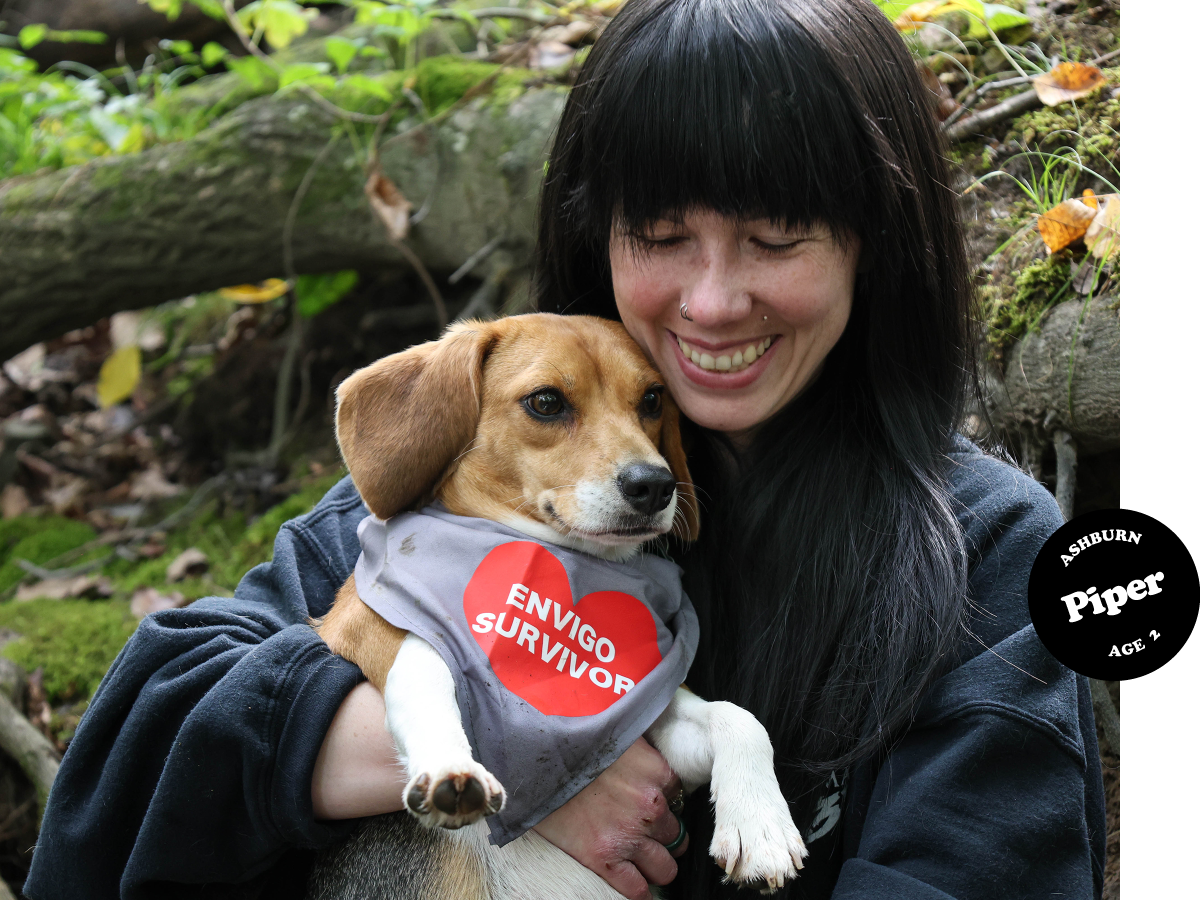

I was looking for a puppy, and Piper comes running up to me and starts licking my face. And I’m like, ‘This is the one.’ ”
“I have PTSD, autism, and social anxiety. Unfortunately, trained service dogs are very difficult to come by—the waiting list is, like, five years long, and it costs about $20,000 to $25,000. I decided I was going to train my own. I was looking for a puppy, and Piper comes running up to me and starts licking my face. And I’m like, ‘This is the one.’
“Beagles are meant to go and howl in the woods and chase down rabbits. They are actually not good for service dogs. But I have made it work, and Piper is doing extraordinarily well. She’s very, very smart. I have all of these puzzles for her that I bought to keep her occupied. I’ll set out five or six at a time, and she’ll have them figured out in, like, three minutes.
“If I start to have a meltdown, she has to be able to stop me from hurting myself. Sometimes while I’m driving, I’ll start scratching at myself or start hitting myself, and she’ll come over and poke at my arm with her head or scratch my hands so that I have the awareness that I’m doing it.
“Now I’m able to work without my anxiety medication. I’m able to go to grocery stores and public events. I went to Fairfax Comic Con by myself a couple of weeks ago, which before Piper never would have been even a possibility. She is going to dress up for Halloween—she’s going to be Zero from The Nightmare Before Christmas.”
Back to Top
Healing A Loss
After the death of their previous dog, Anne Alikonis’s family felt a void. Along came Rose.
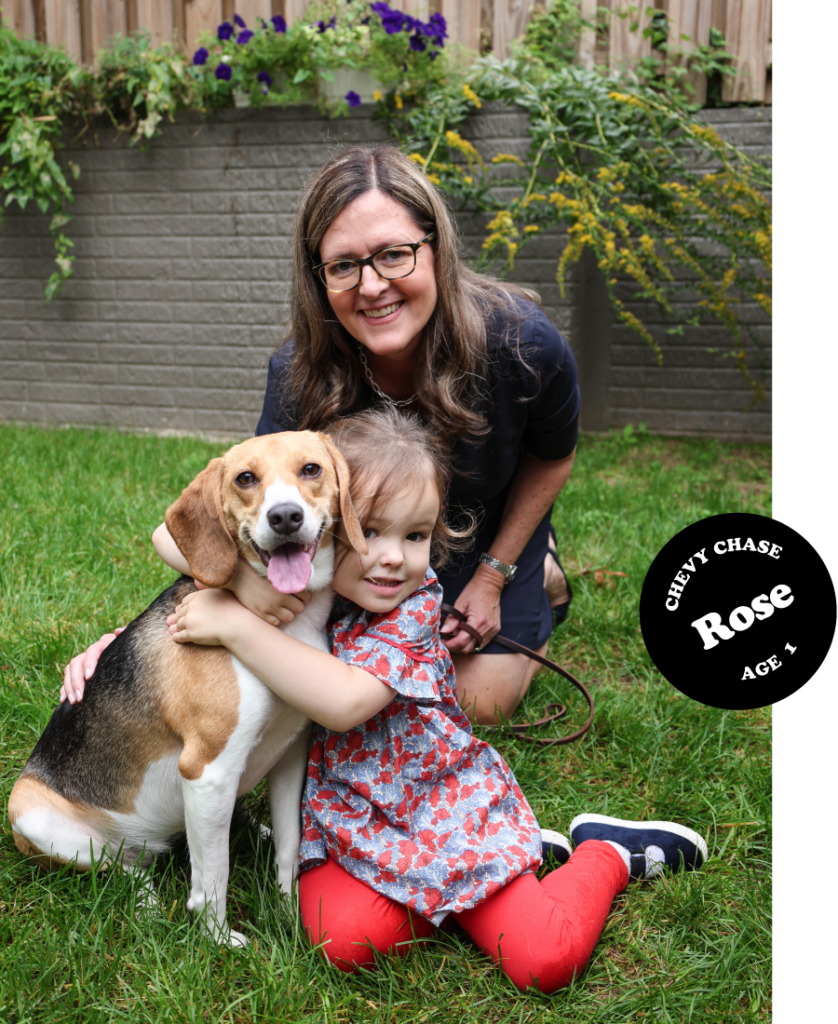
“It had been about a year since we had lost my 16-year-old beagle, Charlie, to cancer. When I heard about the poor conditions these beagles were living in at Envigo, I felt compelled to help. Getting another dog—and rescuing a beagle in particular in these circumstances—was a way to honor Charlie.
“I remember picking Rose up. She gave me this soulful look. I felt an instant connection with her. I was looking for a sign as to whether this was the right decision and which dog to choose—that look just confirmed it.
“She immediately formed a strong bond with our daughter, Viviane, who was three at the time. Rose has this amazing ability to reset our daughter’s moods. Our daughter can be in tears about something, and when she sees Rose wagging her tail, her face lights up and she’s giggling again. I like to think that Charlie introduced Viviane to dogs and that Rose has really nurtured that love.
“Rose really seeks out human interaction. It’s hard to imagine what her life in a testing facility would have been, one that’s completely devoid of positive human interaction. You hear about a person getting rescued by the dog they saved. Rose is a really good example. You think that maybe a new dog is going to replace your old dog—but rather than simply filling that void, Rose unexpectedly helped our family heal.”
Back to Top
Buddying Up
It was love at first sight for Ron Cruz and Oscar—who are living their best lives together
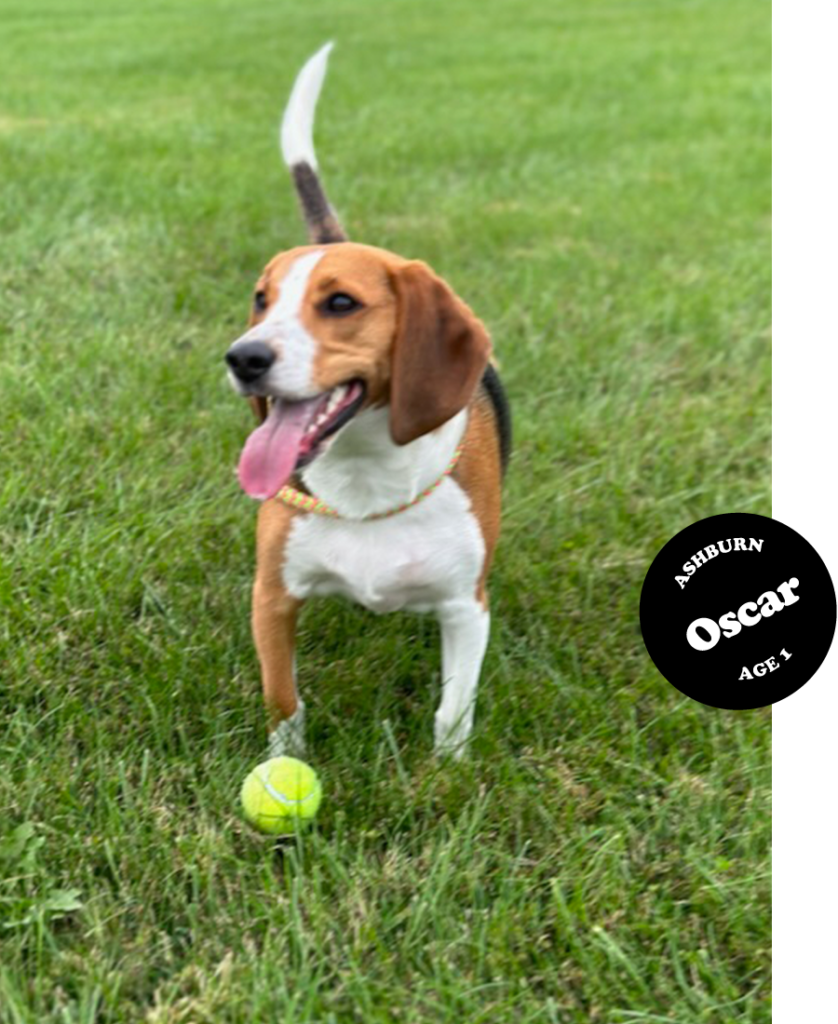
“He actually chose me. They brought two beagles in the room. One of them kind of sat in the corner and was shy, and Oscar just jumped up on me.
“He was easy to train. I can get him to sit down, roll on his back, high-five. He’s very food-motivated. He likes almost everything except sharp cheddar. If you’re thinking of cooking something, he can smell your thoughts.
“We do everything together. We’ll go to Starbucks and get a pup cup. I take him to Frying Pan Park all the time and look at the chickens and the farm animals. He loves riding in the car. He’s constantly taunting my other dogs to play. He loves to find my socks and hide them—he’s got a little igloo house, so I’ve got to go in there once a week and kind of find out what he’s taken.
“Oscar is like my therapy dog. When you’re down or up or whatever, he’s there to share and just be there for me. I’ve had dogs since I was a little boy. He’s the best dog I’ve ever had. There’s not one day where I’m not thankful. I don’t take that for granted. I try to give him his best life, you know?”
Back to Top
Statehouse Champion
How a Virginia lawmaker took up the cause of protecting the Envigo beagles—and adopted two of his own
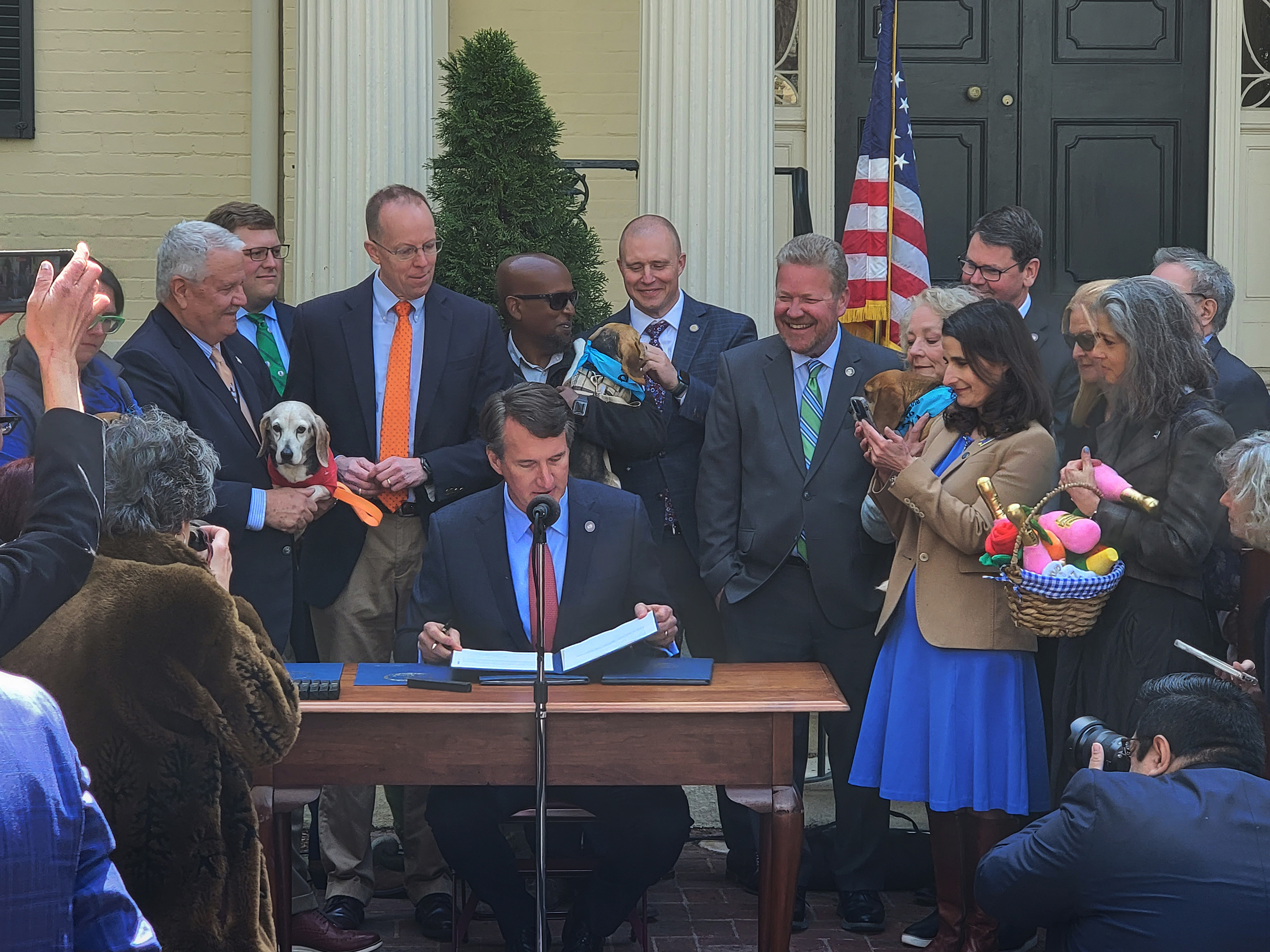
Early in his career, Virginia state senator Bill Stanley was advised never to write a bill involving animals. “I took that as a challenge,” says the Franklin County Republican. In 2019, Stanley saw drone footage of the Envigo facility taken by the animal-rights group Showing Animals Respect and Kindness (SHARK). Beagles were stacked in cages, defecating on the dogs underneath.
A year later, in August 2020, he joined another state senator on a tour of the facility to see how conditions were supposedly improving. His group came upon a loading dock where around ten dogs in two cages were being shipped to testing sites. In near 100-degree heat, Stanley reached out to pet one of them, who gently settled her head into his open palm and peered up at him. “I turned to them and I said, ‘This dog is too nice to experiment on. I want to buy this dog,’ ” he says.
Per state rules, Stanley couldn’t accept the dog as a gift. So he “bought” her for $1,000, with the money going to create a dog run. Stanley left with Daisy, now four years old—and a mission. “That was, for me, an invigoration,” he says.
After a 2021 undercover investigation by People for the Ethical Treatment of Animals (PETA) produced even more evidence of ghastly mistreatment at the facility, Stanley was enraged. He went back unannounced, but someone had tipped off the facility and Stanley was met by Envigo lobbyists. Stanley asked to see the puppy pens, which he describes as a “sea of beagles just dancing around for human attention.” The company’s chief operating officer explained how testing around the country had slowed during the pandemic, leaving the site with a more-than-400-beagle surplus. At one point, according to the PETA investigation, understaffing meant that fewer than 20 employees were caring for more than 5,000 dogs.
Surrounded by floppy-eared beagles, Stanley turned to the lobbyists. “I said, ‘Look around you, so you know who you are representing—these dogs will all be dead.’ ” (PETA’s undercover employee discovered more than 350 dead puppies during a seven-month period.) Stanley departed with another beagle he couldn’t bear to leave behind, Dixie, now two years old, and a commitment from Envigo to rehome the pandemic surplus dogs instead of euthanizing them.
To that end, Stanley turned to Sue Bell, executive director of Fairfax’s Homeward Trails Animal Rescue. In February 2022, Bell, John Ramer of Wyoming’s Kindness Ranch Animal Sanctuary, and Lisa Price of California’s Priceless Pets met in Richmond to accept the first group of dogs. Over the next two months, Bell was able to enter the facility and remove about 20 at a time. “It was jubilation to look at these dogs and be able to say, ‘Your suffering is over, your future is about to start,’ ” Bell says. But the site remained open, and the dogs left behind were suffering. “When we went on the property, I would say, ‘I’m sorry, you’re not coming with us today—we’re going to keep fighting for you,’ ” Bell says.
In the Virginia statehouse, Stanley had joined with Northern Virginia Democrat Jen Boysko to craft four bills protecting animals bred and used for experimentation—including one extending state animal-cruelty laws to cats and dogs kept in research facilities and another requiring that animals bred for testing be offered for adoption prior to euthanasia. Stanley subtly lobbied for the legislation by bringing Envigo puppies he was fostering—ones Bell had rescued—to his office, where people came to pet them and inquire about adoptions. Stanley’s bills ultimately passed unanimously in both the Senate and the House and were signed into law by Governor Glenn Youngkin in April 2022.
The combination of a federal lawsuit and the so-called “beagle bills” triggered the Envigo facility’s closure and the mass rescue that followed. Meanwhile, Daisy and Dixie are thriving, reminding Stanley of what he hopes will be his legacy: “I’m a politician and a lawyer. I joke that when I get to the pearly gates and they’re getting ready to press the down escalator, I’ll say, ‘No, no, no—the beagles!’ ”
Back to Top
Lost and Found
A data analyst in Florida is helping beagle owners find their dogs’ scattered siblings and parents
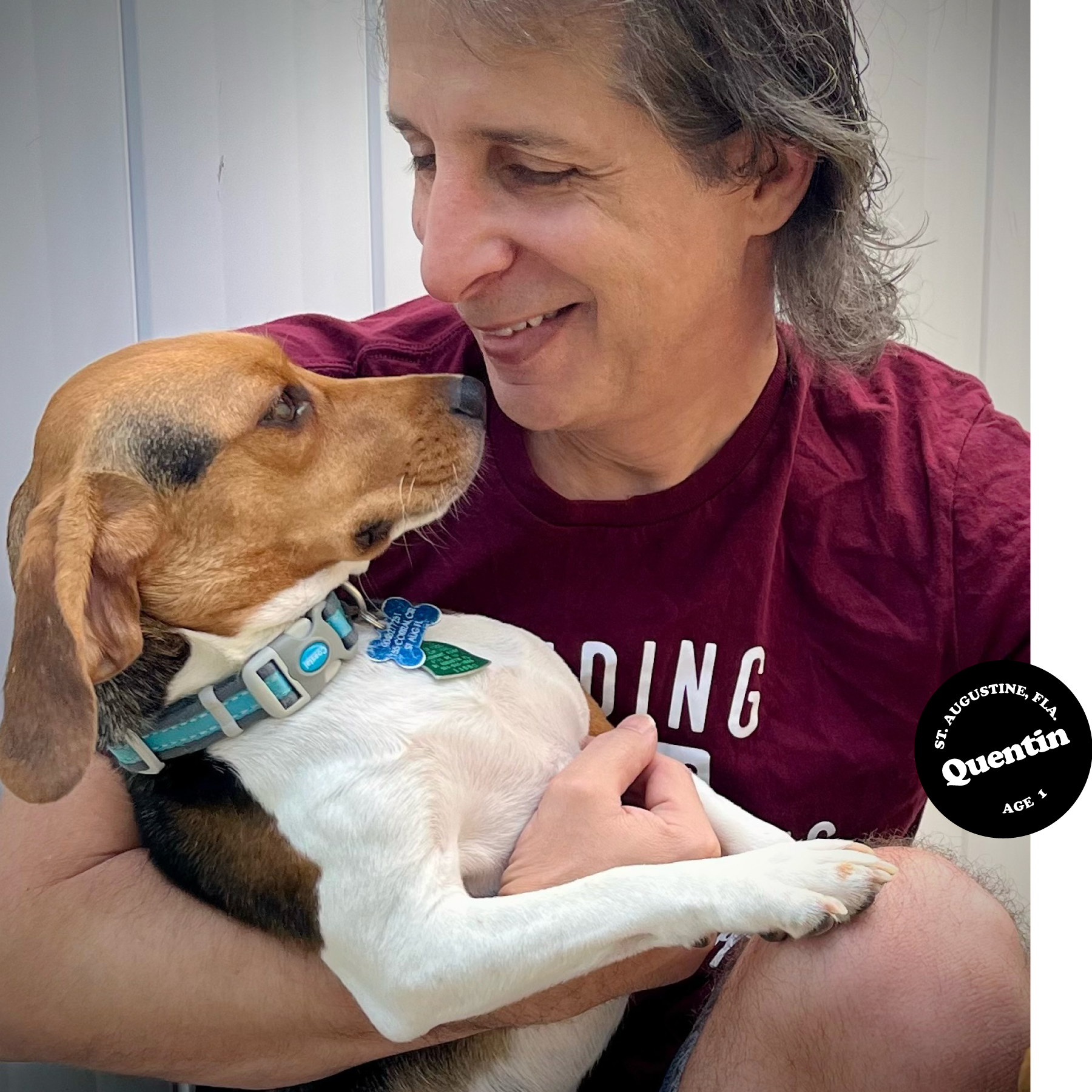
Michael Taylor has a full-time job as a data analyst—and spends more than 40 hours a week mining data about the Envigo beagles. A Florida resident, he’s the manager of Finding Connections, a database he created to identify the dogs and link them to their scattered relatives. Some owners received paperwork while adopting, but not every record was accurate. To date, Taylor has located owners for more than 2,000 beagles. He has also provided owners with information allowing them to know if their pets received certain vaccinations and has connected the canines with lost siblings and parents.
Taylor’s work began as a personal mission. There were attempts to link beagles across different Facebook groups, and some of those relationships were grouped into a spreadsheet in which Taylor spotted a now-confirmed sibling for Quentin, the Envigo beagle he adopted from the Humane Society of Nassau. The problem was that Taylor didn’t feel confident in the data. He began reaching out to groups involved with the rehoming, and starting in November 2022, Sue Bell of Homeward Trails Animal Rescue in Fairfax shared records for 230 dogs.
Almost a year later, Taylor has become a canine cryptanalyst. He begins by asking questions about the tattooed figures in a dog’s ear: Left ear or right? Numbers, letters, or a combination? How many? With answers, he can identify that the beagle came from Envigo (left ear, all letters, six digits) and can get started unearthing connections.(Fun facts: Lucy is the most popular name for females, and owners have been identified in every continental US state except Utah.) Taylor also has fulfilled his original goal: confirming that Quentin’s five siblings are alive and finding his mother, Robyn. Says Taylor: “People just actively continue to follow it every day, hoping and praying their beagle will show up.”
Back to Top
Lessons in Gratitude
Thanks to Alice, Erin Kohl has a daily, furry reminder of what truly matters
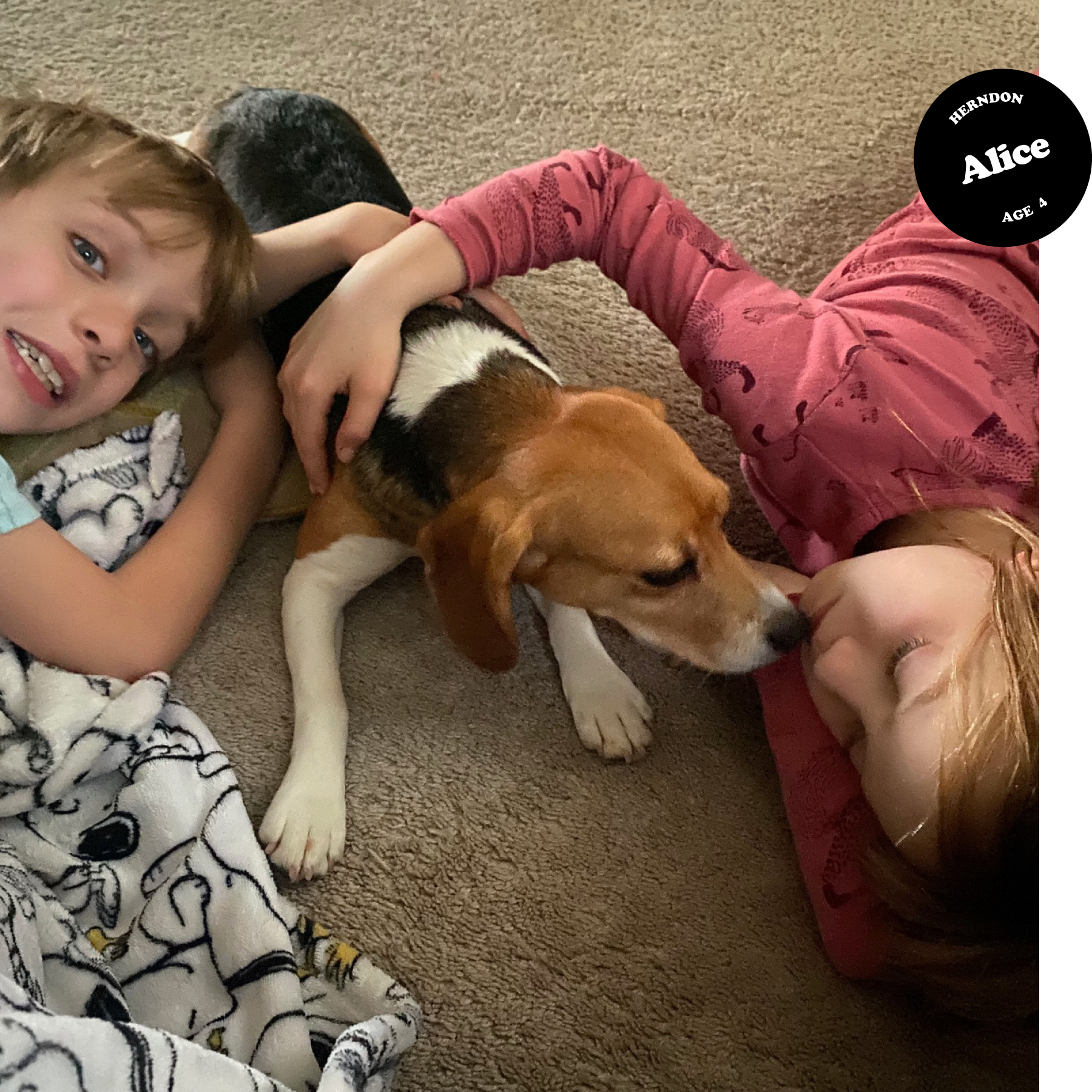
“Alice was so timid when we met her. Everything freaked her out: noise, getting too close to her, approaching too fast. At first, she wouldn’t sleep at all. She just paced the house. I slept on the floor for months, and then we slowly got her to settle. It took months of getting her to trust us and be comfortable.“Now she lounges all over the house. My daughter, she’s nine—you should see the video she took of Alice on Mother’s Day, because Alice had litters at Envigo. She gave Alice a cape, and we made turkey meatballs. She’ll probably have a tea party or picnic for Alice’s birthday.
“I remember a moment when Alice was sitting with my kids reading a book, and she was just so content—almost like ‘This is my family, this is love.’ She’s so grateful about life and little things. I love watching the world through her eyes: the first time she saw a butterfly or walked on a trail and sniffed things.
“It opens your eyes, how powerful it is to love someone. When you watch all the Envigo dogs, there’s just something about their expressions. They’re really loving the experience and grateful for it. It changes your perspective on appreciating things in life. Look at what she’s been through, and she’s the sweetest, most loving thing you can imagine.”
Back to Top
The More the Merrier
When Bonnie and Baeleigh joined Tim O’Reilly’s family—which already included a beagle named Bentley—they created a new pack

“Between my wife and I, we have six children. So it seemed like having three pups was natural. Dogs are pack animals, but beagles even more so. They love being in a group—having others around and the excitement of that. Anytime somebody comes home, it’s all just tails and yelps and happiness and they’re jumping up and down.
“I used to joke with people [when] I’d take the dogs out for a walk, come back, and show the [tangled] leashes: ‘Hey, my dogs know how to French-braid.’ If they [are out and] get on a squirrel scent, they bark and howl. It is loud. One time in one of the community chats, [neighbors] said, ‘Did anybody hear the dog that got hit by a car?’ That was our dogs, just howling.
“Bonnie and Baeleigh don’t like surprises. Loud sounds make them tuck their tails and crouch down, especially Baeleigh. They eat their food in under ten seconds, and they look around like they’re ready for another dog to steal it. What we understand is that’s how they were fed [at Envigo]—one bowl would go into a cage with a bunch of them. It’s heartbreaking to know they went through that.
“We have a Veterinary Sciences Program here at Chantilly High School [where O’Reilly is an assistant principal], and they do dog-sitting. So the three of them come in and they’re popular. The students don’t know my name, but they know the beagles’ names.”
Back to Top
Moving Forward, Together
In the wake of tragedy, Eric Oakes and his wife, Linda, have found “unconditional love” with Victoria
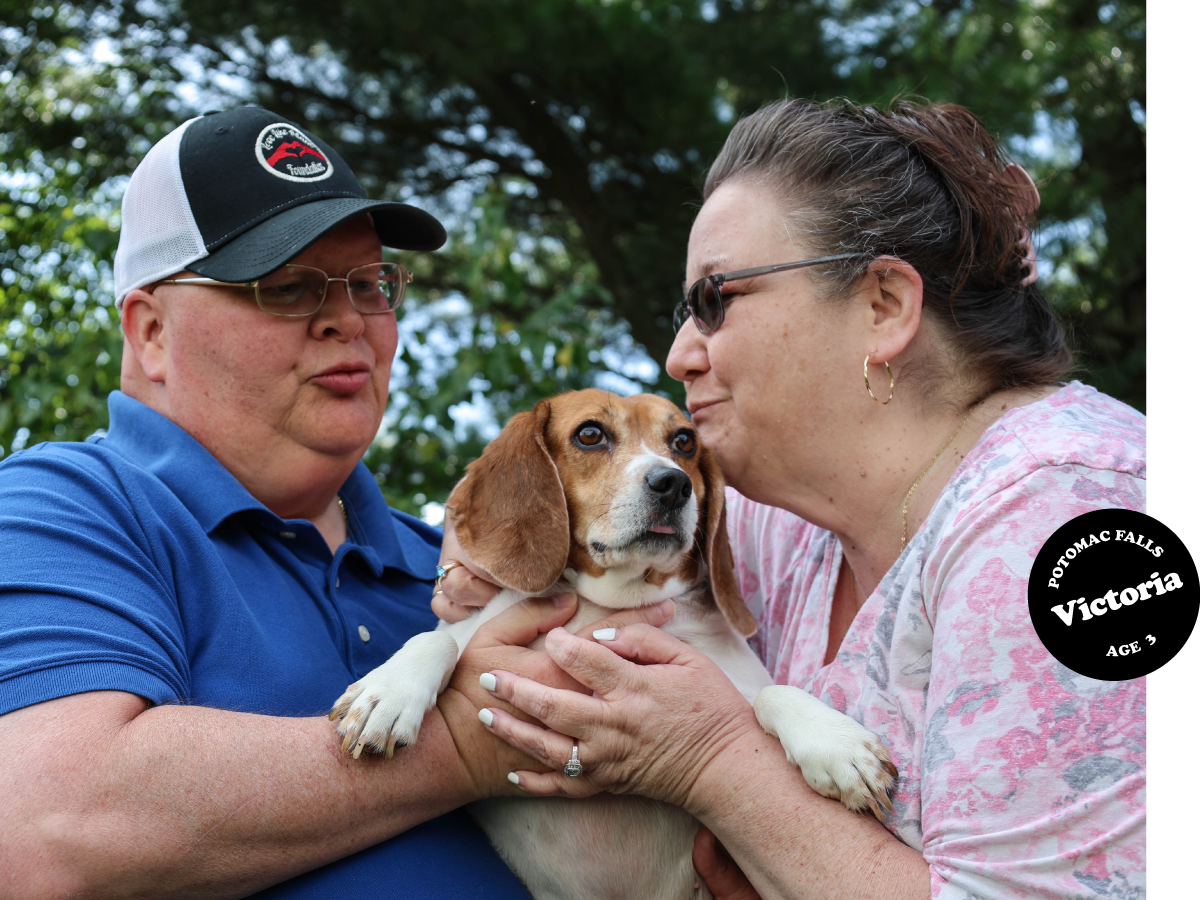
Virginia Commonwealth University student Adam Oakes, 19, died from alcohol poisoning during a fraternity event in 2021. Last year, Virginia passed a law named after Adam requiring hazing-prevention training and education for all college students.
Knowing that we can provide unconditional love to an animal that has been abused and has had a life of misery—and that she gives it back to us—is amazing.”
“When my son, Adam, passed, it wrecked our world. I reached out to my local state senator, Jen Boysko, to make sure this doesn’t happen to another family. We crafted ‘Adam’s Law.’ Senator Boysko was the co-patron of the ‘beagle bills’ [legislation inspired by Envigo and intended to protect animals]. When we learned that these dogs needed to be adopted, we had to do our part to try to pay back what she had done for us.
“When we went to adopt, there were a number of beagles. They were puppies, jumping around and happy. Then they brought Victoria out. She hid in the corner. She had been nursing recently, had just had a litter. She was scared of a leaf blowing by. You could tell she had emotional and severe trauma. We knew that was the dog we wanted to adopt.
“Victoria definitely has some issues. They will be with her the rest of her life. But if you saw her today versus when we first got her, it’s a night-and-day difference. The first few days, she didn’t want to come out of the trans-port kennel we brought her in. But I said, ‘Once you get out of there, you’re never going back in.’ I didn’t want her to be trapped anymore. And you know what? She never went back in.
“We haven’t been able to find her pups or her siblings. We’ve lost our only child, so we feel a sad connection there. We’re not giving up on finding them. My favorite thing now is that every night she lays in my lap and falls asleep. Knowing that we can provide unconditional love to an animal that has been abused and has had a life of misery—and that she gives it back to us—is amazing.”
In July, more than a dozen dogs gathered in Leesburg under circumstances that would have been unimaginable when they were born. Their paws touched grass. They didn’t have to fight for food—instead, they ate cupcakes served by people who cared about them. The company that once owned these dogs called them “research models.” You might know them as beagles.
A year earlier, these animals were among the roughly 4,000 rescued from a facility in Cumberland, Virginia, where they’d been bred for scientific experiments. The traits that make beagles wonderful pets—compact size, docility, pleasant temperament—also make them ideal for research. In 2021, an undercover investigation by an animal-rights group found horrific conditions: dogs and puppies crammed into cages, some injured or dead, living in filth, eating rotting, maggot-infested food, and sometimes euthanized while they were conscious.

The company that owned the facility, Envigo, claimed it treated the beagles humanely. A series of USDA inspections found otherwise. Last year, after Envigo settled a lawsuit filed by the Justice Department against the company, a federal judge ordered the facility closed.
The largest rescue in the history of the Humane Society of the United States followed. The Envigo beagles became national news. That July, rescue groups collected thousands of them in Cumberland and began finding them homes. Some went west, including one adopted by Prince Harry and Meghan Markle. Many stayed in the Mid-Atlantic, where their new families communicate via Facebook groups and reunions such as the one in Leesburg, which saw guests enter a large backyard via a path decorated with balloons.
Inside, there was a tent with tiaras reading happy birthday and a banner proclaiming “Come, Sit, Stay, It’s Time to Paw-ty.” The beagles, many of whom wore envigo survivor bandannas, frolicked and bayed and ate treats. They celebrated the only birthday ever recorded for most of them: the date these research models got to become dogs.
Back to Top
Big Help
The Envigo rescue was the largest in the history of the Humane Society of the United States. Below, a closer look at the numbers.

Beagles rescued from Envigo’s facility

Beagles taken in by Fairfax’s Homeward Trails Animal Rescue, 488 of whom were sent to partner organizations

Days it took to dispatch the animals across the country

Donations to the Humane Society to help the beagles

Shelters across 29 states that accepted the dogs

Beagles adopted out by Homeward Trails, a 100-percent success rate
Back to Top
Protect and Serve
For V. Furhiman, rescuing Piper has been nothing short of life-changing
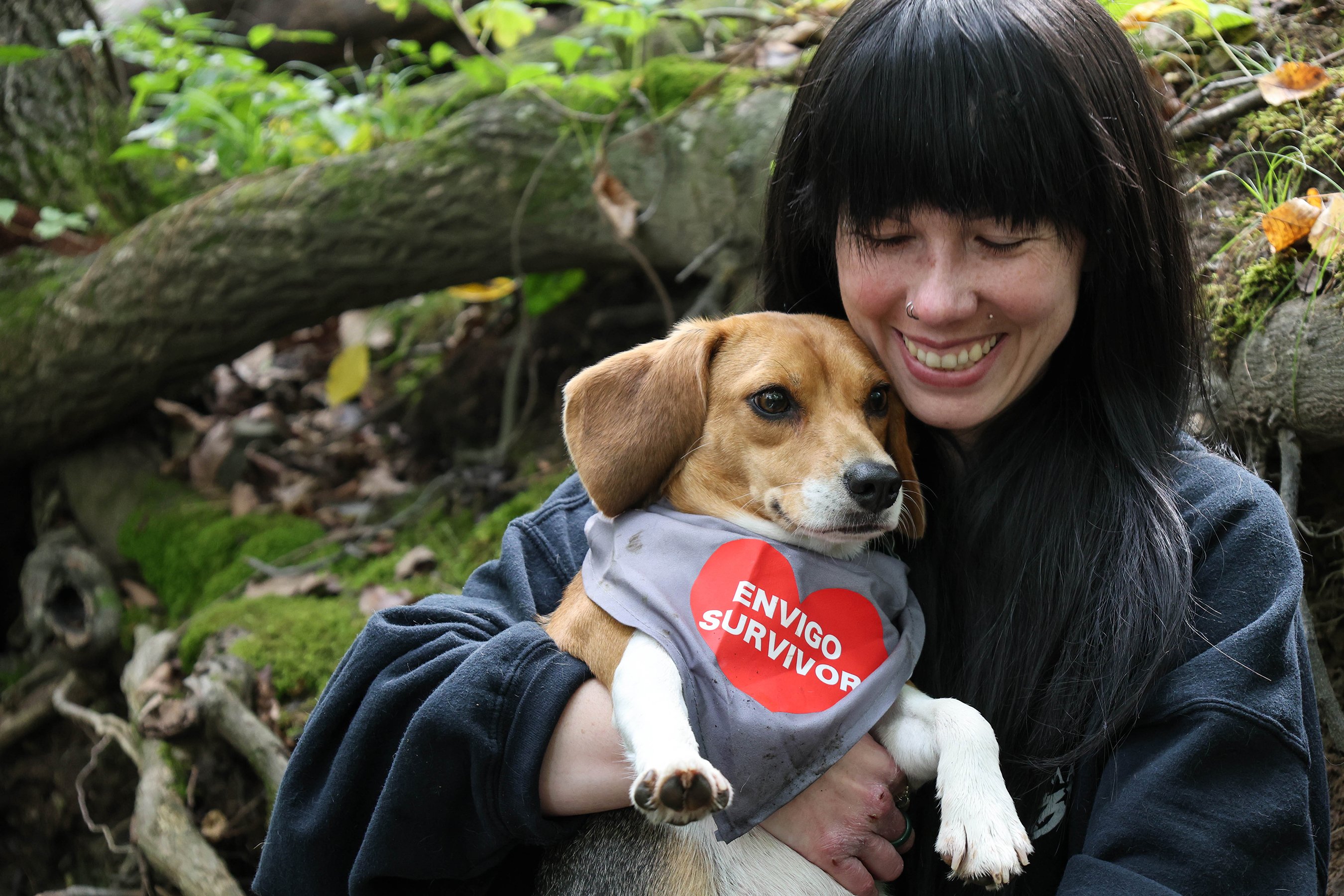
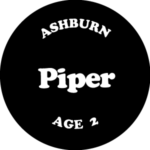
“I have PTSD, autism, and social anxiety. Unfortunately, trained service dogs are very difficult to come by—the waiting list is, like, five years long, and it costs about $20,000 to $25,000. I decided I was going to train my own. I was looking for a puppy, and Piper comes running up to me and starts licking my face. And I’m like, ‘This is the one.’
“Beagles are meant to go and howl in the woods and chase down rabbits. They are actually not good for service dogs. But I have made it work, and Piper is doing extraordinarily well. She’s very, very smart. I have all of these puzzles for her that I bought to keep her occupied. I’ll set out five or six at a time, and she’ll have them figured out in, like, three minutes.
“If I start to have a meltdown, she has to be able to stop me from hurting myself. Sometimes while I’m driving, I’ll start scratching at myself or start hitting myself, and she’ll come over and poke at my arm with her head or scratch my hands so that I have the awareness that I’m doing it.
“
I was looking for a puppy, and Piper comes running up to me and starts licking my face. And I’m like, ‘This is the one.’
”
“Now I’m able to work without my anxiety medication. I’m able to go to grocery stores and public events. I went to Fairfax Comic Con by myself a couple of weeks ago, which before Piper never would have been even a possibility. She is going to dress up for Halloween—she’s going to be Zero from The Nightmare Before Christmas.”
Back to Top
Healing A Loss
After the death of their previous dog, Anne Alikonis’s family felt a void. Along came Rose.
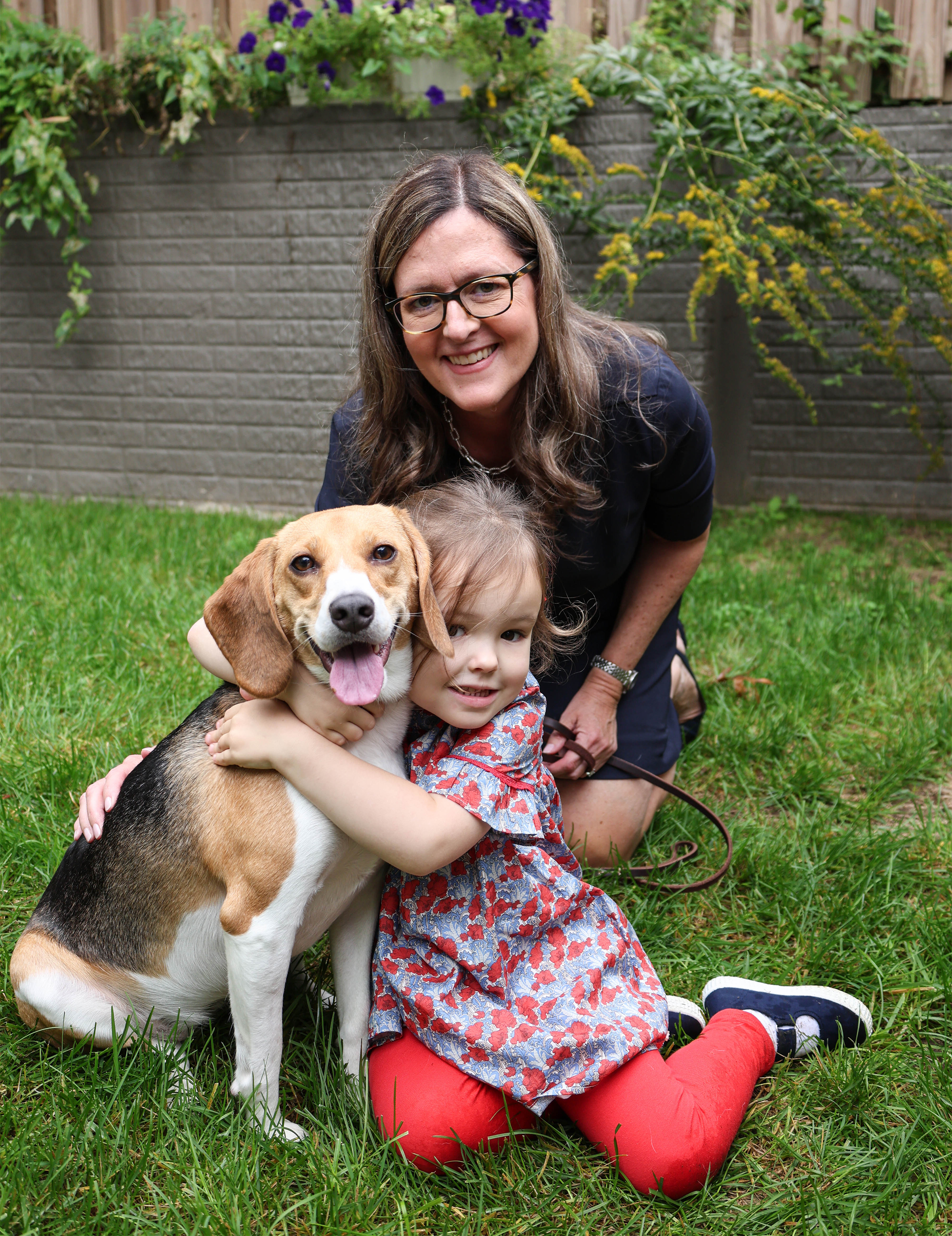

“It had been about a year since we had lost my 16-year-old beagle, Charlie, to cancer. When I heard about the poor conditions these beagles were living in at Envigo, I felt compelled to help. Getting another dog—and rescuing a beagle in particular in these circumstances—was a way to honor Charlie.
“I remember picking Rose up. She gave me this soulful look. I felt an instant connection with her. I was looking for a sign as to whether this was the right decision and which dog to choose—that look just confirmed it.
“She immediately formed a strong bond with our daughter, Viviane, who was three at the time. Rose has this amazing ability to reset our daughter’s moods. Our daughter can be in tears about something, and when she sees Rose wagging her tail, her face lights up and she’s giggling again. I like to think that Charlie introduced Viviane to dogs and that Rose has really nurtured that love.
“Rose really seeks out human interaction. It’s hard to imagine what her life in a testing facility would have been, one that’s completely devoid of positive human interaction. You hear about a person getting rescued by the dog they saved. Rose is a really good example. You think that maybe a new dog is going to replace your old dog—but rather than simply filling that void, Rose unexpectedly helped our family heal.”
Back to Top
Buddying Up
It was love at first sight for Ron Cruz and Oscar—who are living their best lives together

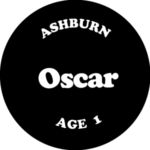
“He actually chose me. They brought two beagles in the room. One of them kind of sat in the corner and was shy, and Oscar just jumped up on me.
“He was easy to train. I can get him to sit down, roll on his back, high-five. He’s very food-motivated. He likes almost everything except sharp cheddar. If you’re thinking of cooking something, he can smell your thoughts.
“We do everything together. We’ll go to Starbucks and get a pup cup. I take him to Frying Pan Park all the time and look at the chickens and the farm animals. He loves riding in the car. He’s constantly taunting my other dogs to play. He loves to find my socks and hide them—he’s got a little igloo house, so I’ve got to go in there once a week and kind of find out what he’s taken.
“Oscar is like my therapy dog. When you’re down or up or whatever, he’s there to share and just be there for me. I’ve had dogs since I was a little boy. He’s the best dog I’ve ever had. There’s not one day where I’m not thankful. I don’t take that for granted. I try to give him his best life, you know?”
Back to Top
Statehouse Champion
How a Virginia lawmaker took up the cause of protecting the Envigo beagles—and adopted two of his own

Early in his career, Virginia state senator Bill Stanley was advised never to write a bill involving animals. “I took that as a challenge,” says the Franklin County Republican. In 2019, Stanley saw drone footage of the Envigo facility taken by the animal-rights group Showing Animals Respect and Kindness (SHARK). Beagles were stacked in cages, defecating on the dogs underneath.
A year later, in August 2020, he joined another state senator on a tour of the facility to see how conditions were supposedly improving. His group came upon a loading dock where around ten dogs in two cages were being shipped to testing sites. In near 100-degree heat, Stanley reached out to pet one of them, who gently settled her head into his open palm and peered up at him. “I turned to them and I said, ‘This dog is too nice to experiment on. I want to buy this dog,’ ” he says.
Per state rules, Stanley couldn’t accept the dog as a gift. So he “bought” her for $1,000, with the money going to create a dog run. Stanley left with Daisy, now four years old—and a mission. “That was, for me, an invigoration,” he says.
After a 2021 undercover investigation by People for the Ethical Treatment of Animals (PETA) produced even more evidence of ghastly mistreatment at the facility, Stanley was enraged. He went back unannounced, but someone had tipped off the facility and Stanley was met by Envigo lobbyists. Stanley asked to see the puppy pens, which he describes as a “sea of beagles just dancing around for human attention.” The company’s chief operating officer explained how testing around the country had slowed during the pandemic, leaving the site with a more-than-400-beagle surplus. At one point, according to the PETA investigation, understaffing meant that fewer than 20 employees were caring for more than 5,000 dogs.
Surrounded by floppy-eared beagles, Stanley turned to the lobbyists. “I said, ‘Look around you, so you know who you are representing—these dogs will all be dead.’ ” (PETA’s undercover employee discovered more than 350 dead puppies during a seven-month period.) Stanley departed with another beagle he couldn’t bear to leave behind, Dixie, now two years old, and a commitment from Envigo to rehome the pandemic surplus dogs instead of euthanizing them.
To that end, Stanley turned to Sue Bell, executive director of Fairfax’s Homeward Trails Animal Rescue. In February 2022, Bell, John Ramer of Wyoming’s Kindness Ranch Animal Sanctuary, and Lisa Price of California’s Priceless Pets met in Richmond to accept the first group of dogs. Over the next two months, Bell was able to enter the facility and remove about 20 at a time. “It was jubilation to look at these dogs and be able to say, ‘Your suffering is over, your future is about to start,’ ” Bell says. But the site remained open, and the dogs left behind were suffering. “When we went on the property, I would say, ‘I’m sorry, you’re not coming with us today—we’re going to keep fighting for you,’ ” Bell says.
In the Virginia statehouse, Stanley had joined with Northern Virginia Democrat Jen Boysko to craft four bills protecting animals bred and used for experimentation—including one extending state animal-cruelty laws to cats and dogs kept in research facilities and another requiring that animals bred for testing be offered for adoption prior to euthanasia. Stanley subtly lobbied for the legislation by bringing Envigo puppies he was fostering—ones Bell had rescued—to his office, where people came to pet them and inquire about adoptions. Stanley’s bills ultimately passed unanimously in both the Senate and the House and were signed into law by Governor Glenn Youngkin in April 2022.
The combination of a federal lawsuit and the so-called “beagle bills” triggered the Envigo facility’s closure and the mass rescue that followed. Meanwhile, Daisy and Dixie are thriving, reminding Stanley of what he hopes will be his legacy: “I’m a politician and a lawyer. I joke that when I get to the pearly gates and they’re getting ready to press the down escalator, I’ll say, ‘No, no, no—the beagles!’ ”
Back to Top
Lost and Found
A data analyst in Florida is helping beagle owners find their dogs’ scattered siblings and parents
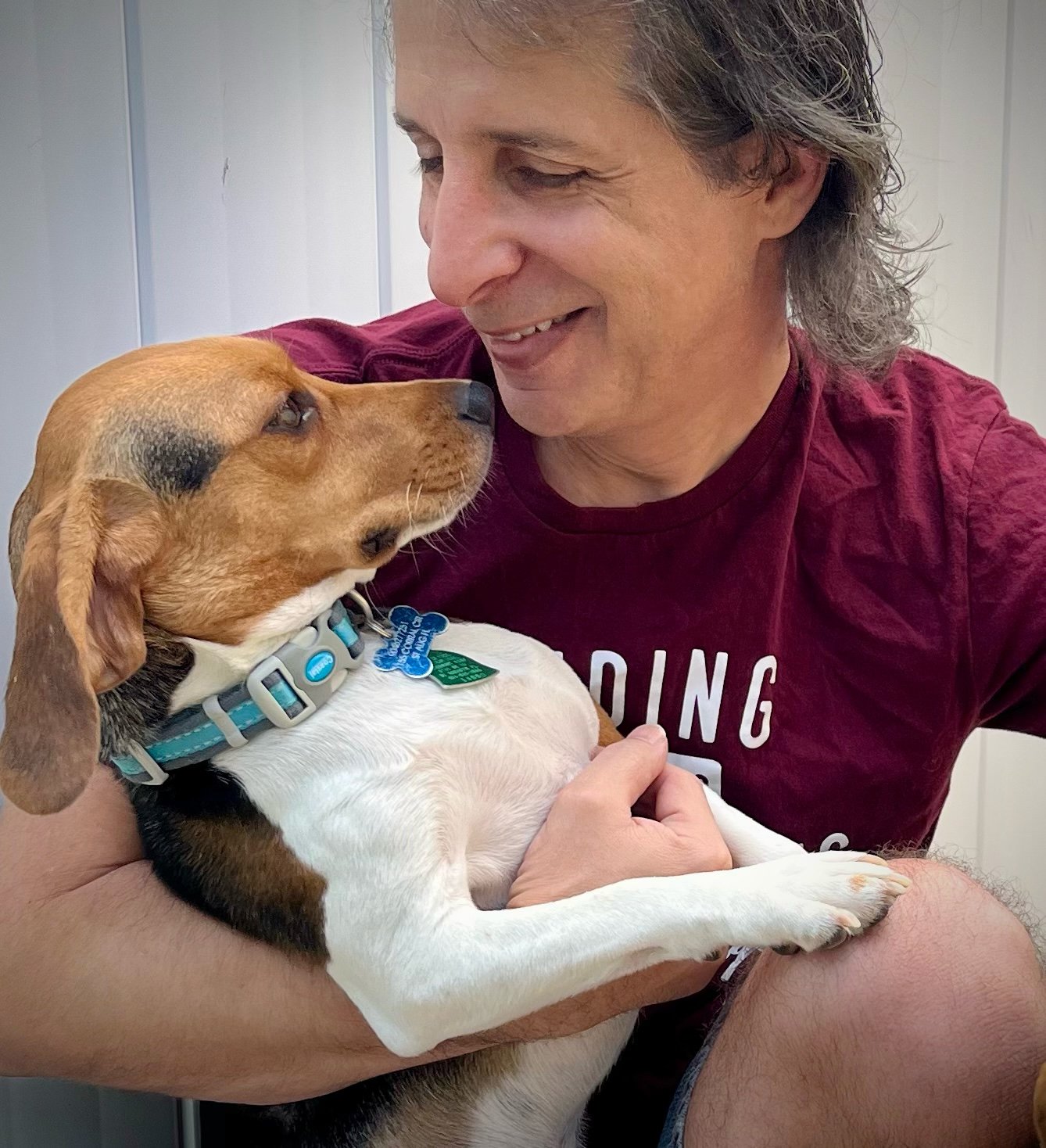
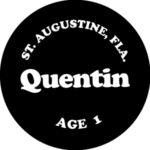
Michael Taylor has a full-time job as a data analyst—and spends more than 40 hours a week mining data about the Envigo beagles. A Florida resident, he’s the manager of Finding Connections, a database he created to identify the dogs and link them to their scattered relatives. Some owners received paperwork while adopting, but not every record was accurate. To date, Taylor has located owners for more than 2,000 beagles. He has also provided owners with information allowing them to know if their pets received certain vaccinations and has connected the canines with lost siblings and parents.
Taylor’s work began as a personal mission. There were attempts to link beagles across different Facebook groups, and some of those relationships were grouped into a spreadsheet in which Taylor spotted a now-confirmed sibling for Quentin, the Envigo beagle he adopted from the Humane Society of Nassau. The problem was that Taylor didn’t feel confident in the data. He began reaching out to groups involved with the rehoming, and starting in November 2022, Sue Bell of Homeward Trails Animal Rescue in Fairfax shared records for 230 dogs.
Almost a year later, Taylor has become a canine cryptanalyst. He begins by asking questions about the tattooed figures in a dog’s ear: Left ear or right? Numbers, letters, or a combination? How many? With answers, he can identify that the beagle came from Envigo (left ear, all letters, six digits) and can get started unearthing connections.(Fun facts: Lucy is the most popular name for females, and owners have been identified in every continental US state except Utah.) Taylor also has fulfilled his original goal: confirming that Quentin’s five siblings are alive and finding his mother, Robyn. Says Taylor: “People just actively continue to follow it every day, hoping and praying their beagle will show up.”
Back to Top
Lessons in Gratitude
Thanks to Alice, Erin Kohl has a daily, furry reminder of what truly matters
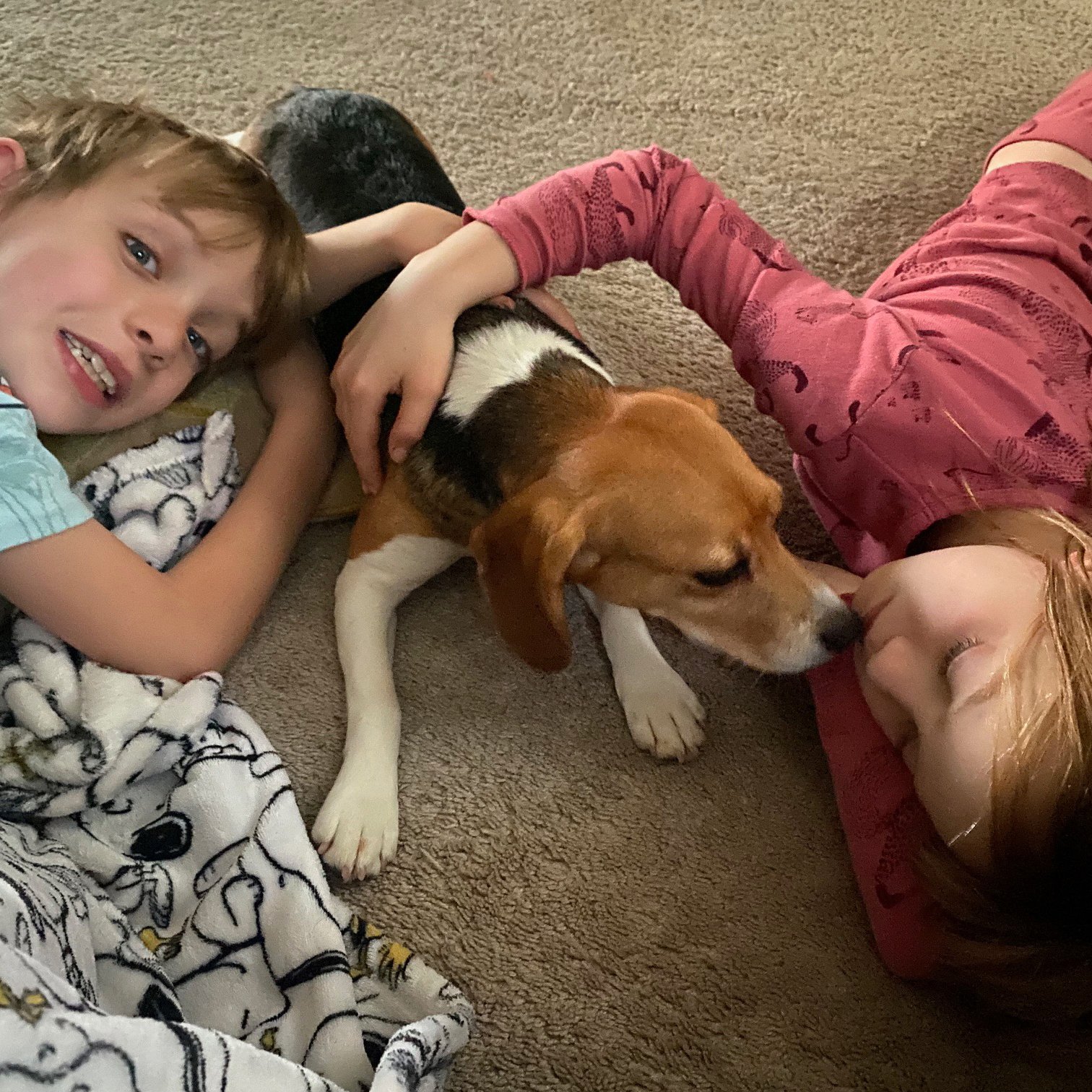
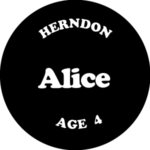 “Alice was so timid when we met her. Everything freaked her out: noise, getting too close to her, approaching too fast. At first, she wouldn’t sleep at all. She just paced the house. I slept on the floor for months, and then we slowly got her to settle. It took months of getting her to trust us and be comfortable.
“Alice was so timid when we met her. Everything freaked her out: noise, getting too close to her, approaching too fast. At first, she wouldn’t sleep at all. She just paced the house. I slept on the floor for months, and then we slowly got her to settle. It took months of getting her to trust us and be comfortable.
“Now she lounges all over the house. My daughter, she’s nine—you should see the video she took of Alice on Mother’s Day, because Alice had litters at Envigo. She gave Alice a cape, and we made turkey meatballs. She’ll probably have a tea party or picnic for Alice’s birthday.
“I remember a moment when Alice was sitting with my kids reading a book, and she was just so content—almost like ‘This is my family, this is love.’ She’s so grateful about life and little things. I love watching the world through her eyes: the first time she saw a butterfly or walked on a trail and sniffed things.
“It opens your eyes, how powerful it is to love someone. When you watch all the Envigo dogs, there’s just something about their expressions. They’re really loving the experience and grateful for it. It changes your perspective on appreciating things in life. Look at what she’s been through, and she’s the sweetest, most loving thing you can imagine.”
Back to Top
The More the Merrier
When Bonnie and Baeleigh joined Tim O’Reilly’s family—which already included a beagle named Bentley—they created a new pack
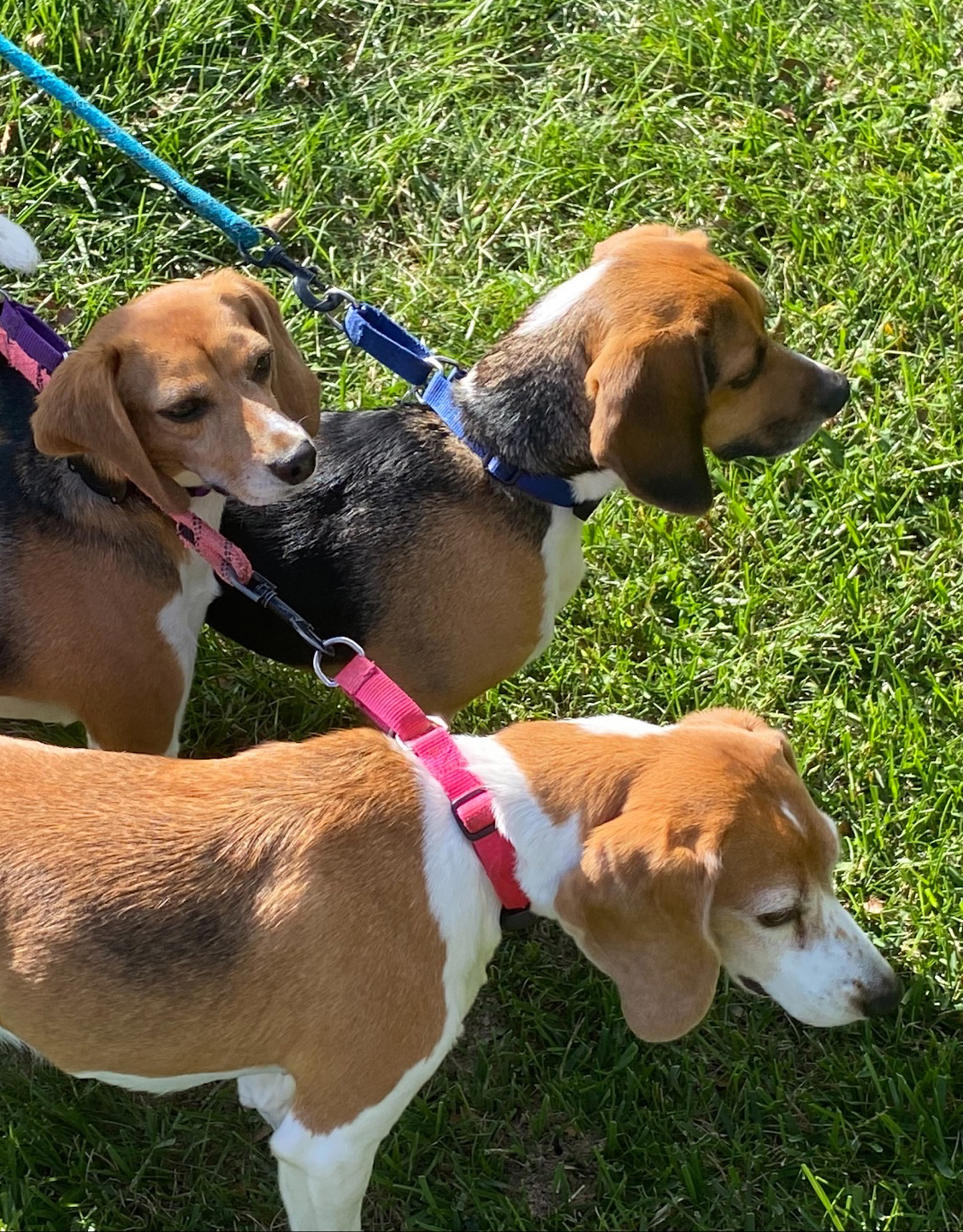
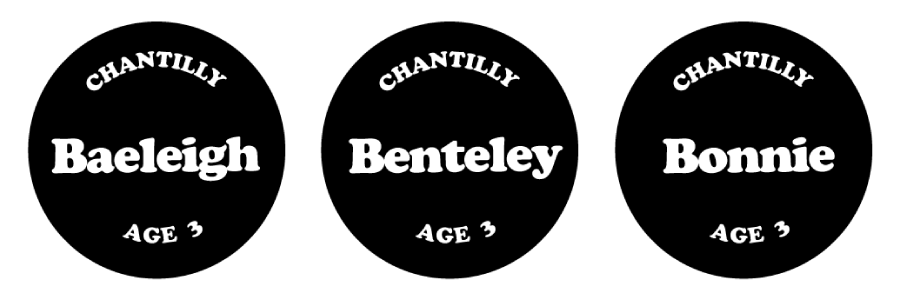
“Between my wife and I, we have six children. So it seemed like having three pups was natural. Dogs are pack animals, but beagles even more so. They love being in a group—having others around and the excitement of that. Anytime somebody comes home, it’s all just tails and yelps and happiness and they’re jumping up and down.
“I used to joke with people [when] I’d take the dogs out for a walk, come back, and show the [tangled] leashes: ‘Hey, my dogs know how to French-braid.’ If they [are out and] get on a squirrel scent, they bark and howl. It is loud. One time in one of the community chats, [neighbors] said, ‘Did anybody hear the dog that got hit by a car?’ That was our dogs, just howling.
“Bonnie and Baeleigh don’t like surprises. Loud sounds make them tuck their tails and crouch down, especially Baeleigh. They eat their food in under ten seconds, and they look around like they’re ready for another dog to steal it. What we understand is that’s how they were fed [at Envigo]—one bowl would go into a cage with a bunch of them. It’s heartbreaking to know they went through that.
“We have a Veterinary Sciences Program here at Chantilly High School [where O’Reilly is an assistant principal], and they do dog-sitting. So the three of them come in and they’re popular. The students don’t know my name, but they know the beagles’ names.”
Back to Top
Moving Forward, Together
In the wake of tragedy, Eric Oakes and his wife, Linda, have found “unconditional love” with Victoria
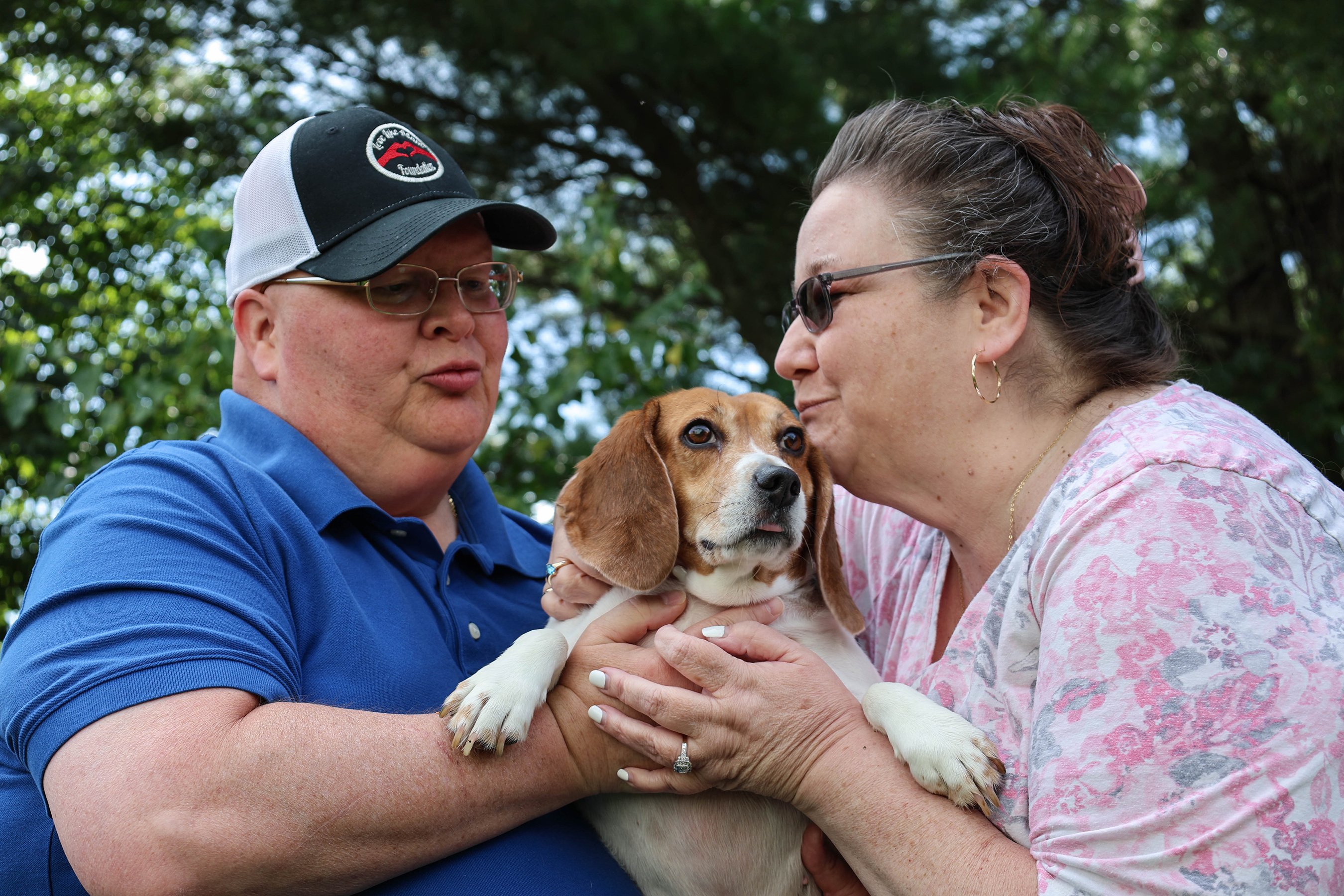
Virginia Commonwealth University student Adam Oakes, 19, died from alcohol poisoning during a fraternity event in 2021. Last year, Virginia passed a law named after Adam requiring hazing-prevention training and education for all college students.

“When my son, Adam, passed, it wrecked our world. I reached out to my local state senator, Jen Boysko, to make sure this doesn’t happen to another family. We crafted ‘Adam’s Law.’ Senator Boysko was the co-patron of the ‘beagle bills’ [legislation inspired by Envigo and intended to protect animals]. When we learned that these dogs needed to be adopted, we had to do our part to try to pay back what she had done for us.
“When we went to adopt, there were a number of beagles. They were puppies, jumping around and happy. Then they brought Victoria out. She hid in the corner. She had been nursing recently, had just had a litter. She was scared of a leaf blowing by. You could tell she had emotional and severe trauma. We knew that was the dog we wanted to adopt.
“
Knowing that we can provide unconditional love to an animal that has been abused and has had a life of misery—and that she gives it back to us—is amazing.”
“
“Victoria definitely has some issues. They will be with her the rest of her life. But if you saw her today versus when we first got her, it’s a night-and-day difference. The first few days, she didn’t want to come out of the trans-port kennel we brought her in. But I said, ‘Once you get out of there, you’re never going back in.’ I didn’t want her to be trapped anymore. And you know what? She never went back in.
“We haven’t been able to find her pups or her siblings. We’ve lost our only child, so we feel a sad connection there. We’re not giving up on finding them. My favorite thing now is that every night she lays in my lap and falls asleep. Knowing that we can provide unconditional love to an animal that has been abused and has had a life of misery—and that she gives it back to us—is amazing.”
This article appears in the November 2023 issue of Washingtonian.
